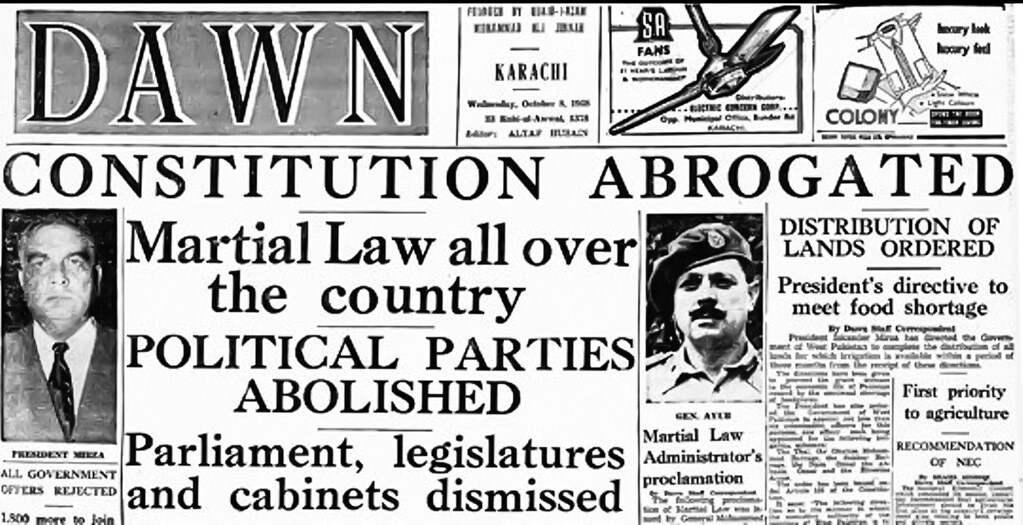The Martial Law of 1958
The 1956 Constitution of Pakistan could remain in force only for two and half years and on October 7, 1958 Major General Iskander Mirza with the help of the armed forces under the command of General Muhammad Ayub Khan abrogated the Constitution and imposed Martial Law in the country. Between August 14, 1947 and October 7 1958, the political intrigue, chaos and undemocratic ways had reached the climax. Uncertainly and insecurity created utter frustration among the people. The deputy speaker of the East Pakistan Assembly was killed in the house as a result of the use of force and terrorism. After the assassination of Liaquat Ali Khan withing a short period of seven years, six government were changed. Due to political turmoil and uncertainty, long term planning could not be made possible and the economic conditions went from bad to worse, No general elections were held in the country even after eleven years since achieving independence. Under the circumstances people were disillusioned with politicians and political parties and there was acute sense of uncertainty in the country. Taking advantage of the situation, the Commander in Chief of army General Muhammad Ayub Khan Captured power. In fact, General Ayub Khan had started taking interest in the politics of the country during the time of governor General Ghulam Muhammad who had demanded resignation from Prime Minister Khawaja Nazimuddin through Ayub Khan. He also had appointed Ayub Khan as Defence minister. When Major General Iskander Mirza became President of Pakistan, Ayub Khan took the administration of the country into his hands as Martial law Administrator and opened the doors for the military dictatorship in the country. Major-General Iskander Mirza who rose from the post of Defense secretary to that of Acting Governor General After the death of Ghulam Muhammad and after the declaration of the country as a Republic he became its first President. Beginning with Ghulam Muhammad, Muhammad Ali Bogra and Chaudhry Muhammad Ali, Iskander Mirza (who became the president of the country ) was yet another bureaucrat who was drawn from the services.
Besides these actions, Ayub Khan constituted summary trial military courts. These courts awarded different punishments in countless cases of different types of offences which included cases against politicians and political workers. Martial Law authorities banned many politician from taking part into politics.
Ayub Khan declared democracy particularly parliamentary system unsuitable for the people of Pakistan and introduced a new system in the country under nomenclature of basic Democracy. The system of direct elections was discontinued and Assemblies and the President were indirectly elected by an Electoral college of eighty thousand basic democrats from all over the country. forty thousand basic democrats were elected each from east Pakistan and west Pakistan. in February 1960, the Martial Law Administrator sought the vote of confidence in a referendum through the members of basic democracies, and was declared to have been elected as the President of the county. After the referendum, the President appointed a constitutional Commission under the chairmanship of the Chief Justice of Pakistan. The Commission submitted its recommendations to the President in May 1961. General Ayub Khan got prepared a Constitution in the light of the recommendations of the commission which was introduced in the country on March 1st, 1962. There were 250 articles and three appendices in this constitution.




